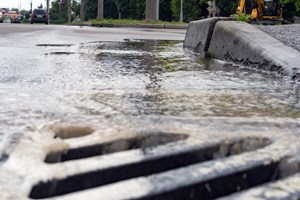Atlantic City reaches settlement with EPA for stormwater management violations
(UI) – The U.S. Environmental Protection Agency announced a settlement with the City of Atlantic City that corrects violations of stormwater management requirements under the Clean Water Act.

The city corrected the violations and will pay a $20,000 penalty. The city further agreed to a $60,000 project to make the system more resilient to the impacts of climate change.
“This settlement will lead to less pollution entering Atlantic City’s stormwater system, enhance local water quality and boost the city’s resilience to climate change,” said EPA Regional Administrator Lisa F. Garcia.
“By enforcing the Clean Water Act and upgrading stormwater management, we’re not just addressing past issues—we’re ensuring a safer, healthier future for Atlantic City’s communities.”
Stormwater flows into catch basins into Atlantic City’s stormwater sewer system and is discharged into area bays and the Atlantic Ocean. In consultation with New Jersey Department of Environmental Protection, EPA conducted a review of Atlantic City’s municipal separate storm sewer system to ensure compliance with the permit issued by the state under the Clean Water Act. The EPA identified several violations of the Clean Water Act.
The violations included not using best practices to manage stormwater, not fully training staff and not updating its Stormwater Pollution Prevention Plan. These issues, documented in Administrative Compliance Orders issued to Atlantic City, could have allowed pollutants into the stormwater system, risking water quality and public health.
In addition to fixing the violations and agreeing to pay a $20,000 penalty, Atlantic City is launching a project that goes beyond compliance. This project, referred to in legal terms as a Supplemental Environmental Project, is to replace about 18,000 square feet of traditional asphalt with permeable pavement.
This pavement allows water to pass through, reducing runoff and filtering pollutants. This upgrade will prevent pollutants from entering the stormwater system and enhance the city’s resilience to climate change by managing stormwater more effectively.
Related News
From Archive

- Glenfarne Alaska LNG targets late-2026 construction start for 807-mile pipeline project
- U.S. water reuse boom to fuel $47 billion in infrastructure spending through 2035
- $2.3 billion approved to construct 236-mile Texas-to-Gulf gas pipeline
- Major water pipe break in Puerto Rico hits over 165,000 customers
- Potomac River Tunnel project enters construction phase beneath Washington, D.C.
- Pennsylvania American Water launches interactive map to identify, replace lead water service lines
- Trump's tariffs drive $33 million cost increase for Cincinnati sewer project
- Utah city launches historic $70 million tunnel project using box jacking under active rail line
- Tulsa residents warned after sewer lines damaged by boring work
- Fatal trench collapse halts sewer construction in Massachusetts; two workers hospitalized



Comments